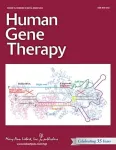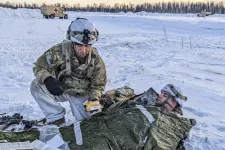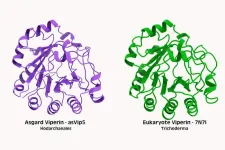(Press-News.org) Brooke Flammang, a biologist at New Jersey Institute of Technology (NJIT), has been awarded nearly $680,000 from the National Oceanic and Atmospheric Administration (NOAA) as part of a growing nationwide effort to save the critically endangered North Atlantic right whale (Eubalaena glacialis).
NOAA Fisheries recently unveiled a more than $9 million initiative funded by the Inflation Reduction Act to support a coalition of universities, nonprofits and scientific organizations engaged in the recovery of the species, which has seen its numbers dwindle to roughly 360 individuals today due to factors ranging from climate-driven changes to its habitat, to fishing gear entanglements and vessel strikes.
As part of the collaborative effort, Flammang's Fluid Loco Lab at NJIT will spearhead the development of non-invasive tag attachment technology to offer near real-time tracking of the species, inspired by the way certain marine life attaches to whales for their survival. The advances could improve our understanding of changes in the whales’ reproduction, distribution patterns and habitat use that have coincided with rising temperatures in its key ocean habitats in recent decades, such as the Gulf of Maine, which has warmed faster than 99% of the global ocean, according to NOAA.
“Previous studies on right whale distribution have used suction cup tags that stay on for short periods of time and need to be retrieved to download the data. Predictions based on those data on where whales will be throughout the year are no longer accurate because of the changing ocean climate causing movement of the whales’ food sources,” said Flammang, an associate professor whose NOAA-funded research will include the use of satellite telemetry for improved tracking of the whales. “The possibility of near real-time monitoring would be game-changing for conservation and regulation policy decisions.”
Flammang's project builds on nearly a decade of research and development of novel tagging technology that mimics the passive forces of suction and friction that power the suction disks of remoras, or sucker fish, which are well known for hitchhiking long distances on the bodies of whales under intense drag forces.
The technology has already surpassed the fish’s notable adhesion ability in some cases, previously demonstrating up to 60% greater hold than what living remoras are able to produce on shark skin. The non-harmful tagging approach could give researchers greater capabilities for long-term monitoring of the whale, which has been protected under the Endangered Species Act since the 1970s.
Approximately $2.8 million from the initiative has been earmarked for monitoring and modeling efforts, which will include researchers from Marine Ecology and Telemetry Research and Duke University’s Marine Geospatial Ecology Lab, in addition to Flammang’s Fluid Loco Lab.
Another estimated $6.9 million will support a collaboration between the Atlantic States Marine Fisheries Commission and fishing industry partners in the development of on-demand (or “ropeless”) fishing gear technology that prevents fishing gear entanglements.
NOAA Fisheries declared an Unusual Mortality Event for the North Atlantic right whale in 2017, attributing 142 whale deaths to entanglement and vessel strikes since that time. Overall, the organization estimates that more than 85% of right whales have been entangled in fishing gear at least once in their lifetime.
The new wave of grant support comes as part of a broader $82 million in funding for North Atlantic right whale recovery efforts from the Inflation Reduction Act, unveiled by the Biden-Harris Administration in September 2023.
“North Atlantic right whales are approaching extinction with approximately 360 individuals remaining, including fewer than 70 reproductively active females,” said Assistant Administrator for NOAA Fisheries Janet Coit in a statement. “It’s imperative we advance our collective actions to help recover this species, and these partnerships will help the science and conservation community do just that.”
For more, visit NOAA's Inflation Reduction Act website.
END
NJIT biologist awarded $680,000 federal grant to save North Atlantic right whale
NJIT biologist Brooke Flammang joins a national conservation effort to advance whale tracking technology to aid in the recovery of one of the world’s most endangered large whale species
2024-08-21
ELSE PRESS RELEASES FROM THIS DATE:
University of Kansas awarded $26 million for new Engineering Research Center from National Science Foundation
2024-08-21
LAWRENCE — The National Science Foundation (NSF) has awarded the University of Kansas $26 million to establish a new Gen-4 Engineering Research Center (ERC) —Environmentally Applied Refrigerant Technology Hub (EARTH) — that will create a sustainable and circular refrigerant economy.
NSF’s Engineering Research Centers bring universities and businesses together to strengthen the competitive position of American industry in the global marketplace.
“NSF's Engineering Research Centers ask big questions in order to catalyze ...
Sandia Science & Technology Park injecting billions into state economy
2024-08-21
ALBUQUERQUE, N.M. — The Sandia Science & Technology Park is being credited with playing a critical role in New Mexico’s economy over the last 25 years, creating high-paying jobs and bringing state-of-the-art technologies to the marketplace.
A study by the Mid-Region Council of Governments shows that over that time, businesses located within the technology park paid out $7.7 billion in wages in the five-county region of Bernalillo, Sandoval, Valencia, Torrance and southern Santa Fe counties. It also shows the park generated ...
Marshall University innovators selected for prestigious NIH-funded entrepreneurship program
2024-08-21
HUNTINGTON, W.Va. – Two Marshall University innovators, Brad Profitt, DC, DPT, DScPT, and M’Hamed Turki, M.D., have been selected to participate in the National Institutes of Health (NIH) funded IDeA Regional Entrepreneurship Development (I-RED) Program, facilitated by the XLerator Network.
The NIH’s competitive I-RED program supports the creation of educational products to promote entrepreneurship in academic institutions. XLerator Health, a health care accelerator based in Louisville, Kentucky, assists startup founders like Profitt and Turki in commercializing their businesses and attracting funding.
Profitt is a co-founder ...
Lipid nanoparticle mRNA therapy improves survival in mouse models of maple syrup urine disease
2024-08-21
New Rochelle, NY, August 21, 2024—Researchers from the University of Pennsylvania, Perelman School of Medicine, Gene Therapy Program, and Moderna, have shown that repeated administration of lipid nanoparticle-encapsulated mRNA therapy significantly extended survival and reduced serum leucine levels in a mouse model of maple syrup urine disease (MSUD). Click here to read the article now.
The researchers, led by James Wilson, M.D., Ph.D., from the University of Pennsylvania, Perelman School of Medicine, evaluated a lipid nanoparticle-based treatment approach to address all possible genetic mutations that can cause MSUD.
“Repeated intravenous ...
USAMMDA commercial partner receives FDA emergency use authorization for plasma powder
2024-08-21
A U.S. Army Medical Materiel Development Activity commercial partner received Emergency Use Authorization from the U.S. Food and Drug Administration for the Department of Defense to use octaplasLG Powder—a potentially lifesaving treatment option for blood replacement therapies in certain operational circumstances. Notice of the EUA for this product was received by the company, Octapharma USA, on Aug. 8, 2024.
USAMMDA’s Warfighter Protection and Acute Care Project Management Office, which has a Cooperative Research and Development Agreement with Octapharma USA, manages research and development efforts for several ...
Pennington Biomedical study to explore effects of soy on blood sugar levels
2024-08-21
Pennington Biomedical Research Center’s Dr. Candida Rebello wants to know more about the intersection of blood sugar levels and a diet rich in soy. This intersection is the primary focus of her new study, “Lifestyle Intervention for Improving Metabolic and Motivational Outcomes,” or MOTIVATE, which explores how specific diets can impact blood sugar, and potentially improve mood and energy levels.
When soy seeds are cut, they produce the anti-microbial compound known as glyceollin, which has been shown to improve insulin sensitivity and cognition. The cut soy seeds will be milled into flour and will be included in the diets of some of the participants. The MOTIVATE ...
Giving an antibiotic to all children under 5 in Africa saves lives
2024-08-21
When UC San Francisco research showed that routinely treating children in Sub-Saharan Africa with a common antibiotic could reduce deaths in children under five, the World Health Organization (WHO) moved quickly to recommend the treatment – but only for infants between 1 and 11 months old.
Now, UCSF researchers have shown that treating babies is not enough. The antibiotic must be given to all children up to 5 years old to realize its full benefit, which is considerable: It lowers child mortality ...
Pivotal study supports belzutifan approval for patients with advanced kidney cancer
2024-08-21
RESEARCH SUMMARY
Study Title: Belzutifan Versus Everolimus for Advanced Renal-Cell Carcinoma
Publication: New England Journal of Medicine, August 22, 2024
Dana-Farber Cancer Institute authors: Toni K. Choueiri, MD
Summary: The LITESPARK-005 phase 3 clinical enrolled 746 patients with metastatic clear cell renal cell carcinoma (ccRCC) who had progressed after treatment with both an immune checkpoint inhibitor (ICI) and an anti-angiogenic therapy. Patients were randomized to receive treatment with either belzutifan, a HIF-2α inhibitor, or everolimus. Overabundant HIF-2α is associated with increased cancer-driving activity. At the second interim analysis of this study, ...
Next time you beat a virus, thank your microbial ancestors
2024-08-21
When you get infected with a virus, some of the first weapons your body deploys to fight it were passed down to us from our microbial ancestors billions of years ago. According to new research from The University of Texas at Austin, two key elements of our innate immune system came from a group of microbes called Asgard archaea.
Specifically, viperins and argonautes, two proteins that are known to play important roles in the immune systems of all complex life — from insects to plants to humans — came from the Asgard archaea. Versions of these defense proteins are also present in bacteria, but the versions in complex life forms are ...
Two UCSB professors selected by the Gordon and Betty Moore Foundation to be Experimental Physics Investigators
2024-08-21
(Santa Barbara, Calif.) — UC Santa Barbara professors Andrew Jayich and Jon Schuller have been selected by the Gordon and Betty Moore Foundation to be part of the 2024 cohort of Experimental Physics Investigators. They join 17 other mid-career researchers from around the country, each receiving a five-year, $1.25 million grant to pursue research goals.
“This initiative is designed to support novel and potentially high-payoff projects that will advance the field of physics but might be hard to fund through traditional funding sources,” said Theodore ...
LAST 30 PRESS RELEASES:
ASU researchers to lead AAAS panel on water insecurity in the United States
ASU professor Anne Stone to present at AAAS Conference in Phoenix on ancient origins of modern disease
Proposals for exploring viruses and skin as the next experimental quantum frontiers share US$30,000 science award
ASU researchers showcase scalable tech solutions for older adults living alone with cognitive decline at AAAS 2026
Scientists identify smooth regional trends in fruit fly survival strategies
Antipathy toward snakes? Your parents likely talked you into that at an early age
Sylvester Cancer Tip Sheet for Feb. 2026
Online exposure to medical misinformation concentrated among older adults
Telehealth improves access to genetic services for adult survivors of childhood cancers
Outdated mortality benchmarks risk missing early signs of famine and delay recognizing mass starvation
Newly discovered bacterium converts carbon dioxide into chemicals using electricity
Flipping and reversing mini-proteins could improve disease treatment
Scientists reveal major hidden source of atmospheric nitrogen pollution in fragile lake basin
Biochar emerges as a powerful tool for soil carbon neutrality and climate mitigation
Tiny cell messengers show big promise for safer protein and gene delivery
AMS releases statement regarding the decision to rescind EPA’s 2009 Endangerment Finding
Parents’ alcohol and drug use influences their children’s consumption, research shows
Modular assembly of chiral nitrogen-bridged rings achieved by palladium-catalyzed diastereoselective and enantioselective cascade cyclization reactions
Promoting civic engagement
AMS Science Preview: Hurricane slowdown, school snow days
Deforestation in the Amazon raises the surface temperature by 3 °C during the dry season
Model more accurately maps the impact of frost on corn crops
How did humans develop sharp vision? Lab-grown retinas show likely answer
Sour grapes? Taste, experience of sour foods depends on individual consumer
At AAAS, professor Krystal Tsosie argues the future of science must be Indigenous-led
From the lab to the living room: Decoding Parkinson’s patients movements in the real world
Research advances in porous materials, as highlighted in the 2025 Nobel Prize in Chemistry
Sally C. Morton, executive vice president of ASU Knowledge Enterprise, presents a bold and practical framework for moving research from discovery to real-world impact
Biochemical parameters in patients with diabetic nephropathy versus individuals with diabetes alone, non-diabetic nephropathy, and healthy controls
Muscular strength and mortality in women ages 63 to 99
[Press-News.org] NJIT biologist awarded $680,000 federal grant to save North Atlantic right whaleNJIT biologist Brooke Flammang joins a national conservation effort to advance whale tracking technology to aid in the recovery of one of the world’s most endangered large whale species





